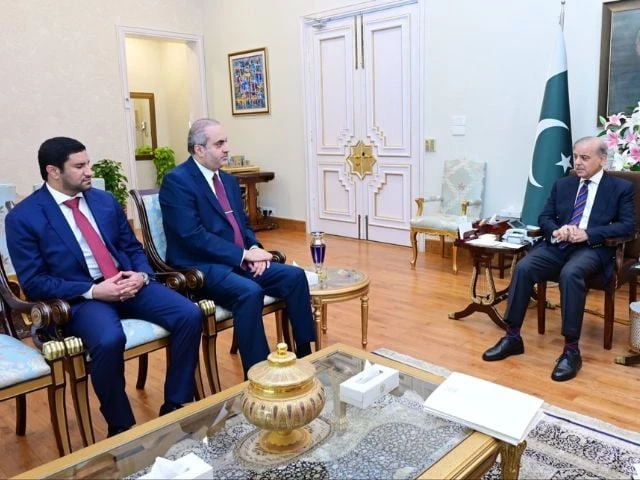PM Shehbaz reaffirms solidarity with Saudi, Qatari envoys
Pakistan reiterates support for stability without escalation or provocation

Prime Minister Shehbaz Sharif reaffirmed Pakistan’s unwavering solidarity with Saudi Arabia and Qatar on Tuesday, as the regional security situation in the Middle East escalated after Iran's missile attacks on a United States military base in Qatar.
PM Shehbaz met separately with the ambassadors of Saudi Arabia and Qatar in Islamabad to discuss the rapidly evolving situation in the region.
Both engagements took place in the aftermath of Monday night’s missile strike, widely reported to have targeted a US facility in the Gulf, according to the Prime Minister's Office.
Shehbaz met Saudi Ambassador Nawaf bin Saeed Al Malkiy to exchange views on ongoing developments and reiterated Pakistan’s strong support for the Kingdom.
In a post on social media platform X, the prime minister wrote: “Met the Ambassador of the Kingdom of Saudi Arabia today and discussed the rapidly evolving situation in the Middle East…Pakistan will continue to work closely with the Kingdom of Saudi Arabia for peace in the region through dialogue and diplomacy”.
Met the Ambassador of the Kingdom of Saudi Arabia today and discussed the rapidly evolving situation in the Middle East. I conveyed my prayers and good wishes for Custodian of the Two Holy Mosques, His Majesty King Salman bin Abdulaziz Al Saud, as well as for my dear brother His… pic.twitter.com/na2QU9J7GA
— Shehbaz Sharif (@CMShehbaz) June 24, 2025
He also conveyed his prayers and well wishes for the Custodian of the Two Holy Mosques, King Salman bin Abdulaziz Al Saud, and Crown Prince Mohammed bin Salman bin Abdulaziz Al Saud. “Pakistan stands with the brotherly people of Saudi Arabia,” said PM Shehbaz.
Read: Iran retaliates with missile strikes on US base in Qatar after nuclear raids
In a separate meeting, the prime minister received Qatari Ambassador Ali Mubarak Ali Essa Al-Khater, during which he expressed solidarity with the Amir and the people of Qatar following the attack on the US military base the previous night.
Met the Ambassador of Qatar this morning to express our solidarity with His Highness the Amir and the brotherly people of Qatar following last night’s attacks. We pray for the safety and security of our Qatari brothers and sisters, and the entire region. Pakistan has always… pic.twitter.com/z4vZRsEgFd
— Shehbaz Sharif (@CMShehbaz) June 24, 2025
Posting on X, PM Shehbaz said: “We pray for the safety and security of our Qatari brothers and sisters, and the entire region”.
He reaffirmed that Pakistan has always advocated for dialogue and diplomacy as the only viable path to peace in the Middle East.
The premier had held telephonic conversations with both ambassadors shortly after news of the missile attacks broke. During these calls, he conveyed Pakistan’s serious concern over the incident and urged all sides to pursue immediate de-escalation.
According to official sources, during the call with Ambassador Al-Khater, the Qatari envoy thanked Shehbaz for his swift outreach, calling it a meaningful gesture of solidarity during a “most unfortunate development”.
In the telephonic exchange with the Saudi ambassador, Shehbaz reiterated Pakistan’s call for restraint and peaceful resolution.
Ambassador Al Malkiy welcomed the statement and agreed that Pakistan and Saudi Arabia must coordinate closely to prevent further escalation.
Earlier today, the Foreign Office issued a statement expressing Pakistan’s deep concern over the growing regional tensions following the missile attacks on the US Al Udeid Air Base in Qatar.
🔊PR NO.1️⃣8️⃣5️⃣/2️⃣0️⃣2️⃣5️⃣
— Ministry of Foreign Affairs - Pakistan (@ForeignOfficePk) June 24, 2025
Pakistan Expresses Deep Concern at the Serious Escalation in the Security Situation in the Region.
🔗⬇️https://t.co/gKGdIoetBq pic.twitter.com/ATxH3Ld12T
In the statement, the Foreign Office said Pakistan strongly condemns violations of the principle of respect for sovereignty and territorial integrity of all countries. It called on all parties to adhere to fundamental principles of international law and urged the exercise of restraint by all sides.
Read more: NSC backs diplomacy over war in region
The statement also reiterated Pakistan’s consistent position that dialogue and diplomacy remain the only viable path to resolving conflicts, and called for immediate steps to de-escalate tensions to avoid further destabilisation in the region.
Meanwhile, Israel has confirmed it has accepted a US-brokered ceasefire proposal with Iran, following mediation efforts led by US President Donald Trump, according to a statement issued by the Israeli government.
Netanyahu thanked Trump for his backing during the escalation, crediting the US administration with supporting Israel’s military posture and helping to neutralise what he described as “the Iranian nuclear threat.”
However, Iran has denied agreeing to any formal ceasefire. In a televised briefing, Foreign Minister Abbas Araghchi rejected reports that Tehran had accepted the US-drafted truce.
“There is no such agreement from our side,” Araghchi said, describing the claims as “propaganda” and reiterating that Iran reserves the right to defend its sovereignty in the face of foreign aggression.
Iran maintained it would halt strikes if Israeli attacks stop.



















COMMENTS
Comments are moderated and generally will be posted if they are on-topic and not abusive.
For more information, please see our Comments FAQ